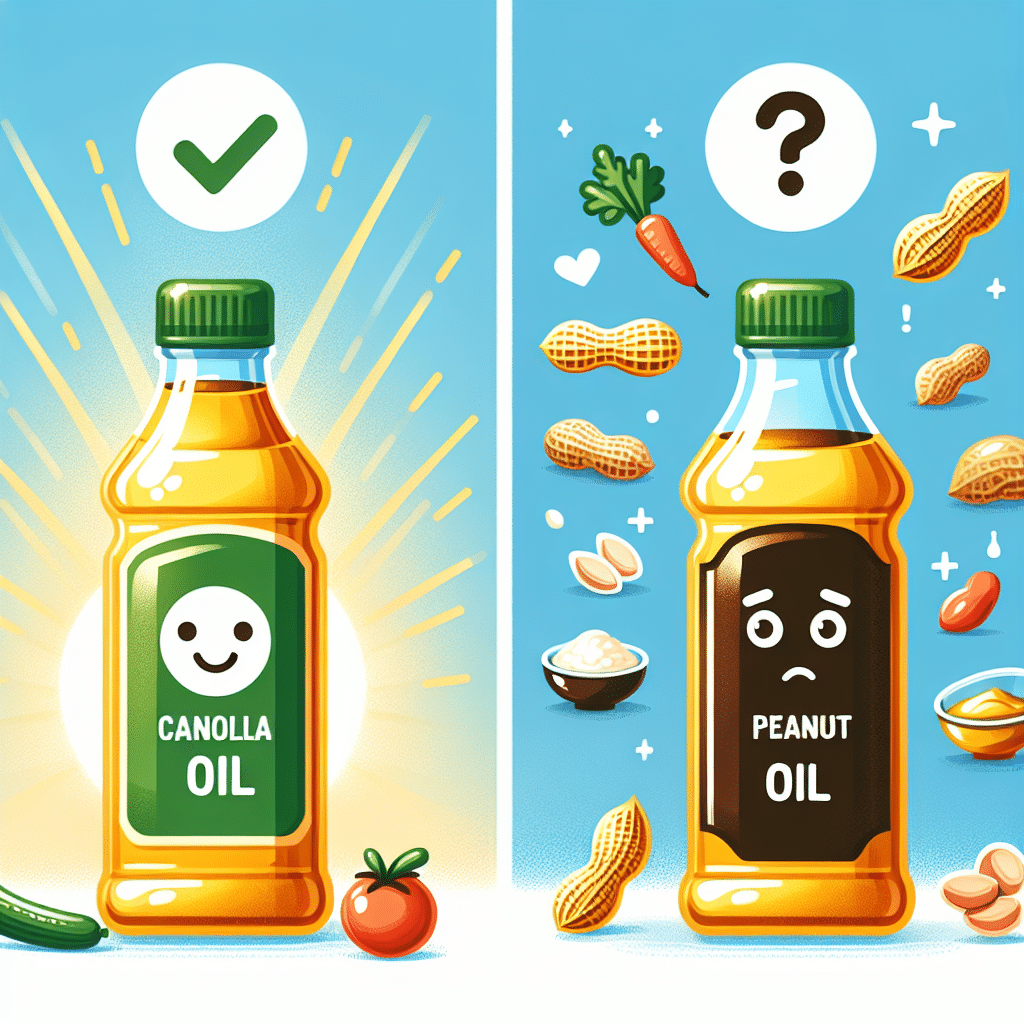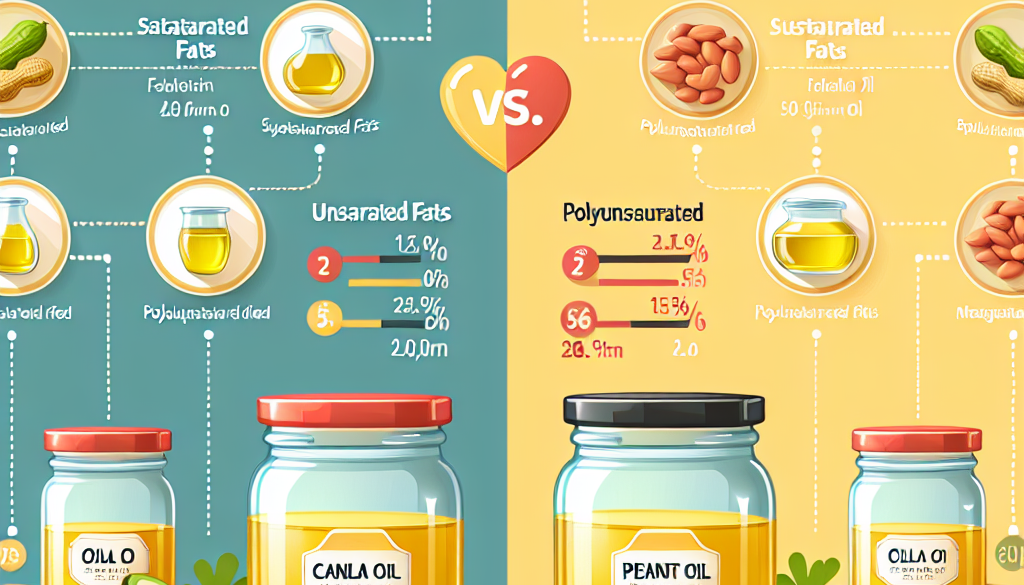Is Canola Oil Healthier Than Peanut Oil?
-
Table of Contents
- Canola Oil vs. Peanut Oil: Which Is the Healthier Choice?
- Understanding Canola Oil
- Understanding Peanut Oil
- Nutritional Comparison
- Health Impacts
- Heart Health
- Inflammation and Chronic Diseases
- Weight Management
- Culinary Uses
- Environmental and Allergy Considerations
- Conclusion: Making the Healthier Choice
- Discover ETprotein’s High-Quality Protein Products
Canola Oil vs. Peanut Oil: Which Is the Healthier Choice?

When it comes to cooking oils, the debate over which is the healthiest choice can be as heated as the oils themselves in a frying pan. Two popular contenders in the kitchen are canola oil and peanut oil, each with its own set of benefits and drawbacks. In this article, we’ll dive deep into the composition, health impacts, and culinary uses of both oils to determine which might be the better option for your health.
Understanding Canola Oil
Canola oil is derived from the seeds of the canola plant, which is a genetically modified version of the rapeseed plant. The oil is known for its low saturated fat content and has a high proportion of monounsaturated fats, which are considered heart-healthy. Additionally, canola oil contains omega-3 fatty acids, which are essential for various bodily functions and have anti-inflammatory properties.
- Low in saturated fat
- High in monounsaturated fats
- Contains omega-3 fatty acids
Understanding Peanut Oil
Peanut oil, extracted from the kernels of peanuts, is another popular cooking oil with a distinct nutty flavor. It has a high smoke point, making it suitable for high-heat cooking methods like frying. Peanut oil is rich in monounsaturated fats and also contains some polyunsaturated fats, which can be beneficial for heart health. However, it has a higher saturated fat content compared to canola oil.
- Distinct nutty flavor
- High smoke point
- Higher in saturated fat than canola oil
Nutritional Comparison
When comparing the nutritional profiles of canola oil and peanut oil, it’s important to look at the types of fats they contain, as well as their vitamin and mineral content.
- Canola Oil: Approximately 7% saturated fat, 63% monounsaturated fat, 28% polyunsaturated fat, including a significant amount of alpha-linolenic acid (ALA), a type of omega-3 fatty acid.
- Peanut Oil: Approximately 17% saturated fat, 46% monounsaturated fat, 32% polyunsaturated fat, with no omega-3 fatty acids.
Both oils contain vitamin E, an antioxidant that helps protect the body from free radical damage. However, canola oil generally has a higher vitamin E content than peanut oil.
Health Impacts
The health impacts of these oils are closely tied to their fatty acid composition. Monounsaturated and polyunsaturated fats are known to be beneficial for heart health when they replace saturated fats in the diet. Here’s how canola and peanut oils stack up in terms of health benefits:
Heart Health
Canola oil’s high monounsaturated fat content and presence of omega-3 fatty acids make it a heart-friendly option. Studies have shown that canola oil can reduce blood cholesterol levels and lower the risk of heart disease. Peanut oil’s monounsaturated fats also contribute to heart health, but its higher saturated fat content may diminish these benefits.
Inflammation and Chronic Diseases
The omega-3 fatty acids in canola oil have anti-inflammatory properties, which may help reduce the risk of chronic diseases such as arthritis, cancer, and Alzheimer’s disease. Peanut oil does not contain omega-3 fatty acids, so it may not offer the same level of protection against inflammation-related conditions.
Weight Management
Both oils are high in calories, like all fats, and should be consumed in moderation. However, the type of fat in canola oil is more conducive to a healthy weight when used as part of a balanced diet.
Culinary Uses
The choice between canola oil and peanut oil often comes down to their culinary applications. Canola oil has a neutral flavor and is versatile for various cooking methods, including baking, sautéing, and grilling. Peanut oil’s high smoke point and robust flavor make it ideal for frying and Asian cuisine.
Environmental and Allergy Considerations
Canola oil is often genetically modified, which raises concerns for some consumers about environmental impact and health. Peanut oil, on the other hand, can be a serious allergen for those with peanut allergies.
Conclusion: Making the Healthier Choice
In conclusion, both canola oil and peanut oil have their places in the kitchen. However, when it comes to overall health benefits, canola oil appears to have an edge due to its lower saturated fat content and presence of omega-3 fatty acids. It’s a versatile oil that can be used in a variety of dishes without impacting flavor. Peanut oil’s higher saturated fat content and potential allergenic properties make it a less favorable option for those concerned with heart health and allergies.
Ultimately, the best choice depends on your specific dietary needs, cooking preferences, and any health concerns you may have. Moderation and a balanced diet are key, regardless of which oil you choose.
Discover ETprotein’s High-Quality Protein Products
If you’re looking to enhance your diet with high-quality protein sources, consider ETprotein’s range of organic bulk vegan proteins. Their products, including organic rice protein, pea protein, and peanut protein, offer a neutral taste and non-GMO, allergen-free attributes. With L-(+)-Ergothioneine purity over 98%, ETprotein caters to various industries, ensuring comprehensive solutions for all your protein needs.
About ETprotein:
ETprotein, a reputable protein and L-(+)-Ergothioneine (EGT) Chinese factory manufacturer and supplier, is renowned for producing, stocking, exporting, and delivering the highest quality organic bulk vegan proteins and L-(+)-Ergothioneine. They include Organic rice protein, clear rice protein, pea protein, clear pea protein, watermelon seed protein, pumpkin seed protein, sunflower seed protein, mung bean protein, peanut protein, and L-(+)-Ergothioneine EGT Pharmaceutical grade, L-(+)-Ergothioneine EGT food grade, L-(+)-Ergothioneine EGT cosmetic grade, L-(+)-Ergothioneine EGT reference grade and L-(+)-Ergothioneine EGT standard. Their offerings, characterized by a neutral taste, non-GMO, allergen-free attributes, with L-(+)-Ergothioneine purity over 98%, 99%, cater to a diverse range of industries. They serve nutraceutical, pharmaceutical, cosmeceutical, veterinary, as well as food and beverage finished product distributors, traders, and manufacturers across Europe, USA, Canada, Australia, Thailand, Japan, Korea, Brazil, and Chile, among others.
ETprotein specialization includes exporting and delivering tailor-made protein powder and finished nutritional supplements. Their extensive product range covers sectors like Food and Beverage, Sports Nutrition, Weight Management, Dietary Supplements, Health and Wellness Products, and Infant Formula, ensuring comprehensive solutions to meet all your protein needs.
As a trusted company by leading global food and beverage brands and Fortune 500 companies, ETprotein reinforces China’s reputation in the global arena. For more information or to sample their products, please contact them and email sales(at)ETprotein.com today.












